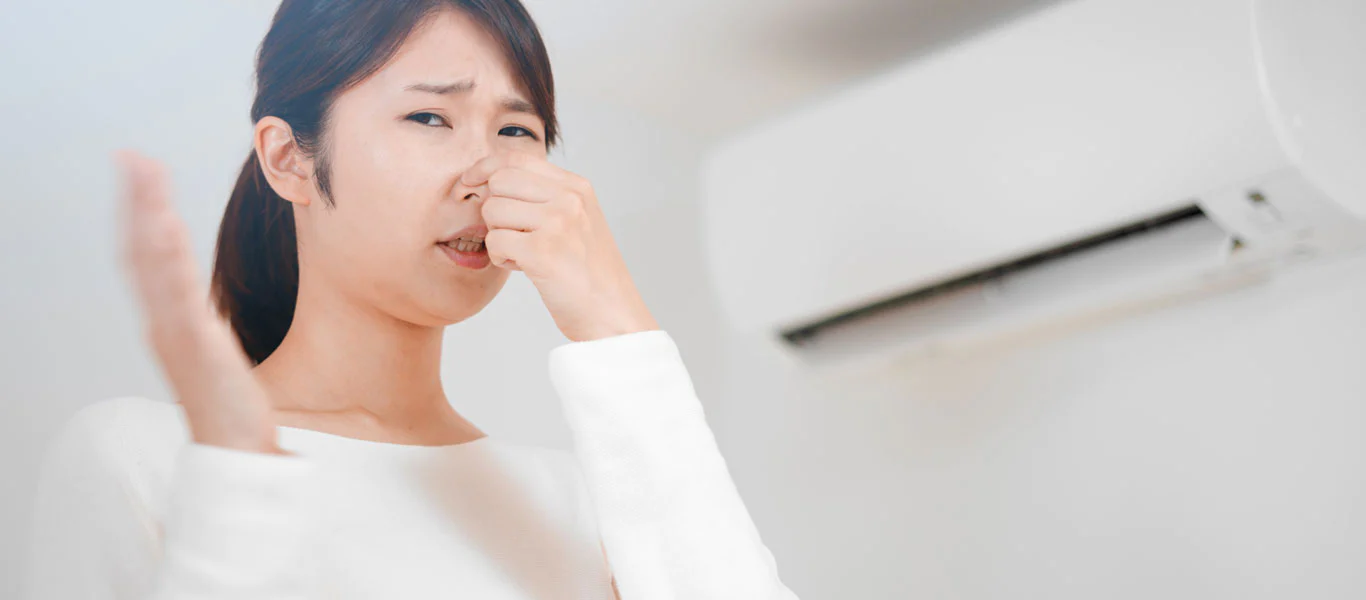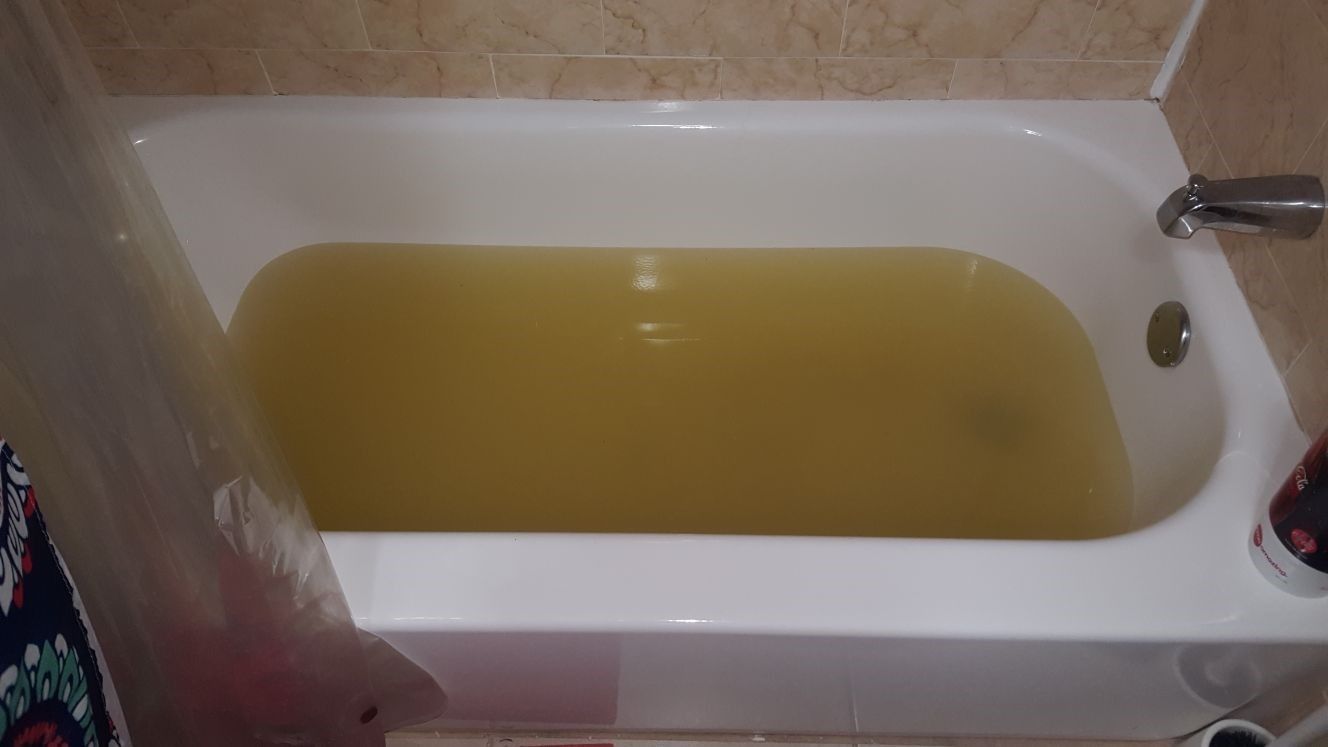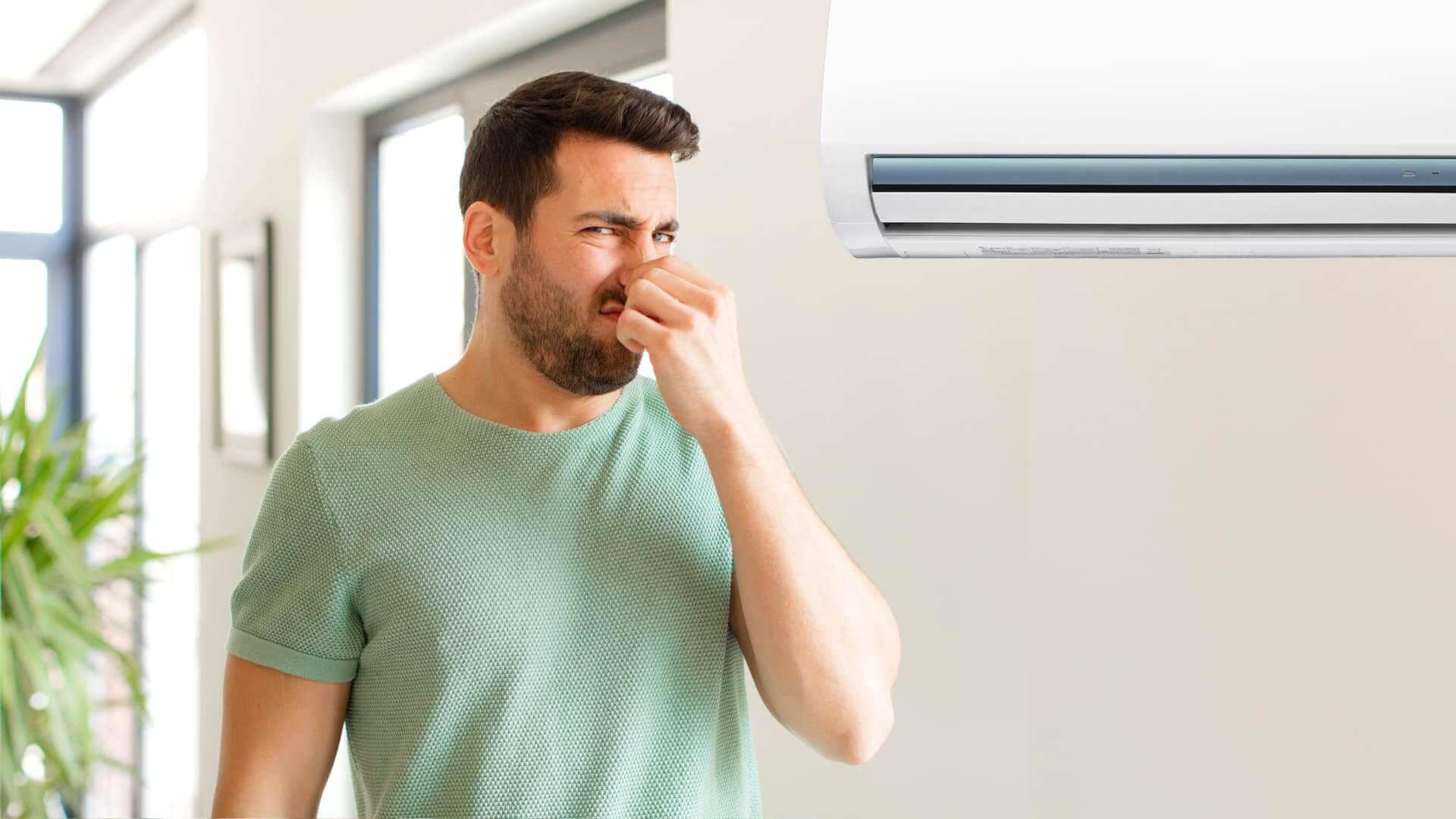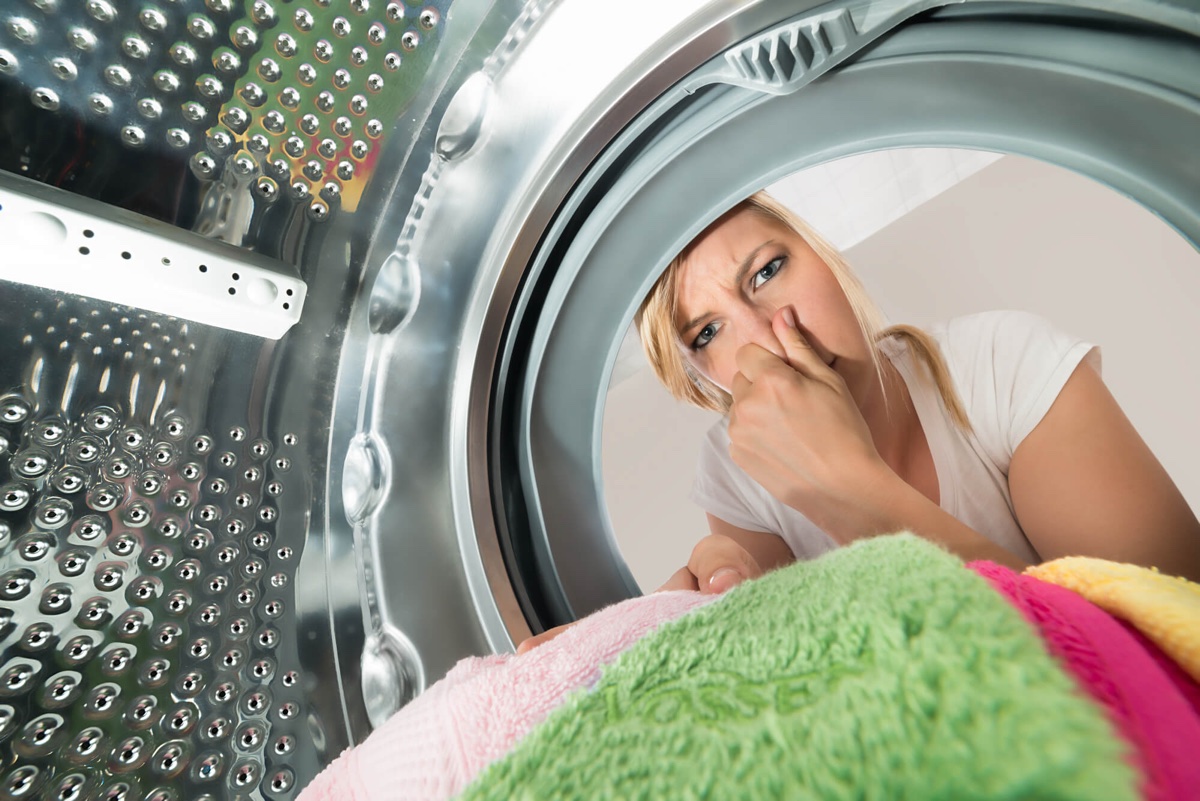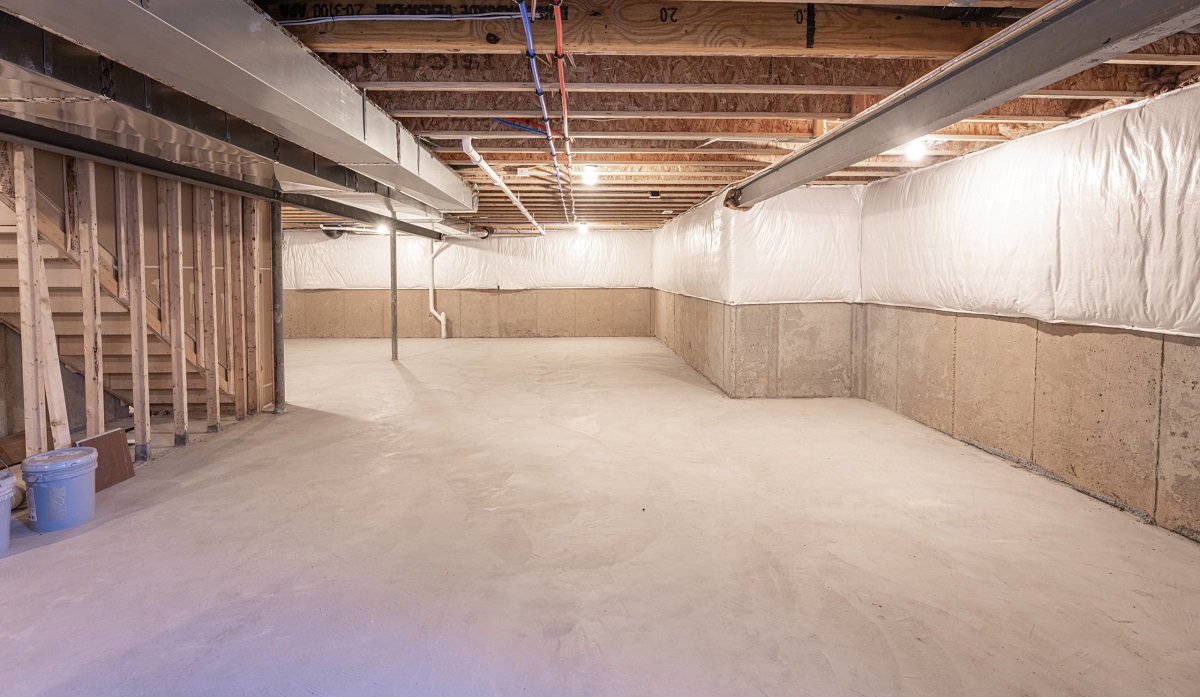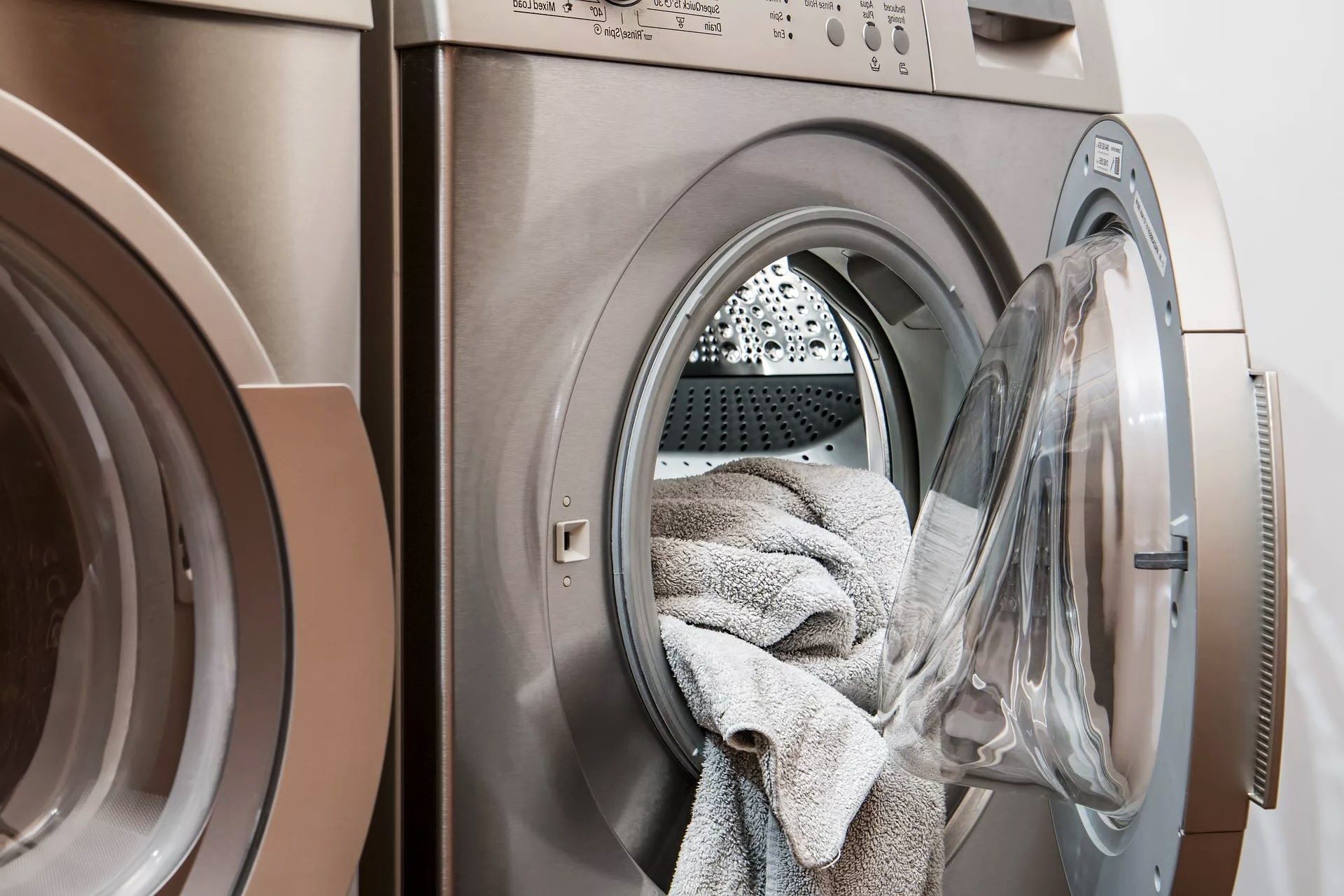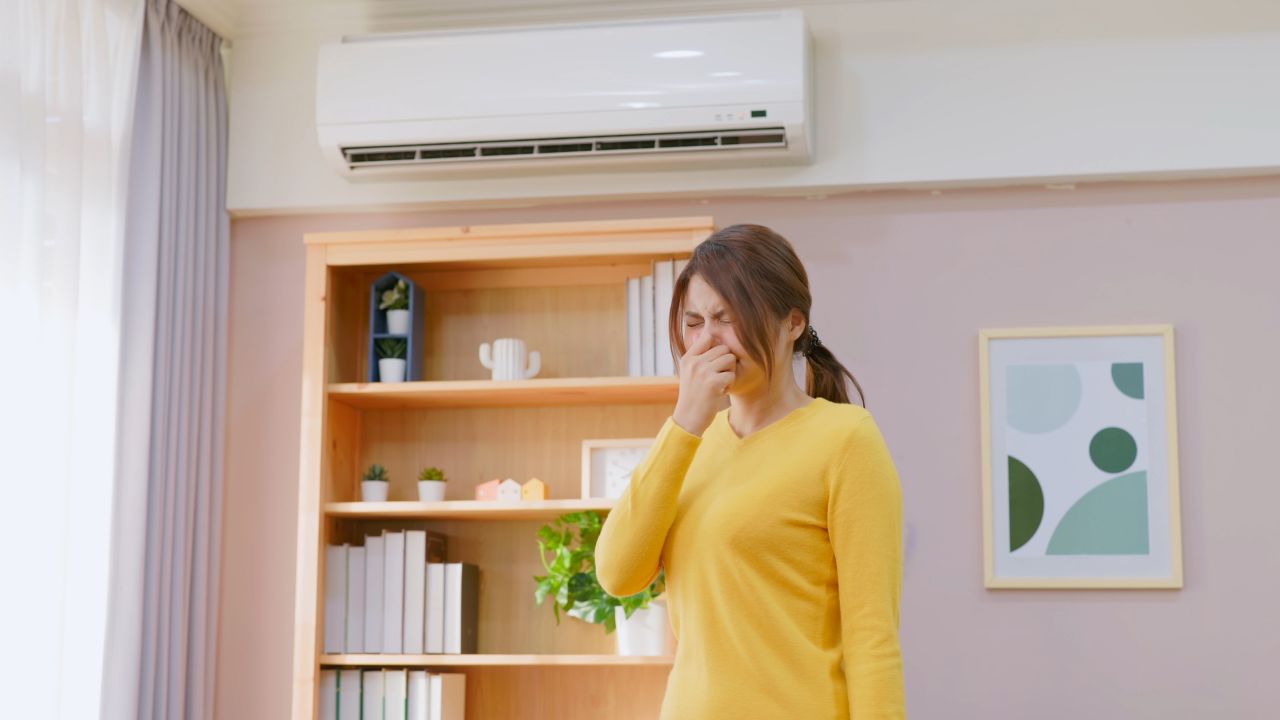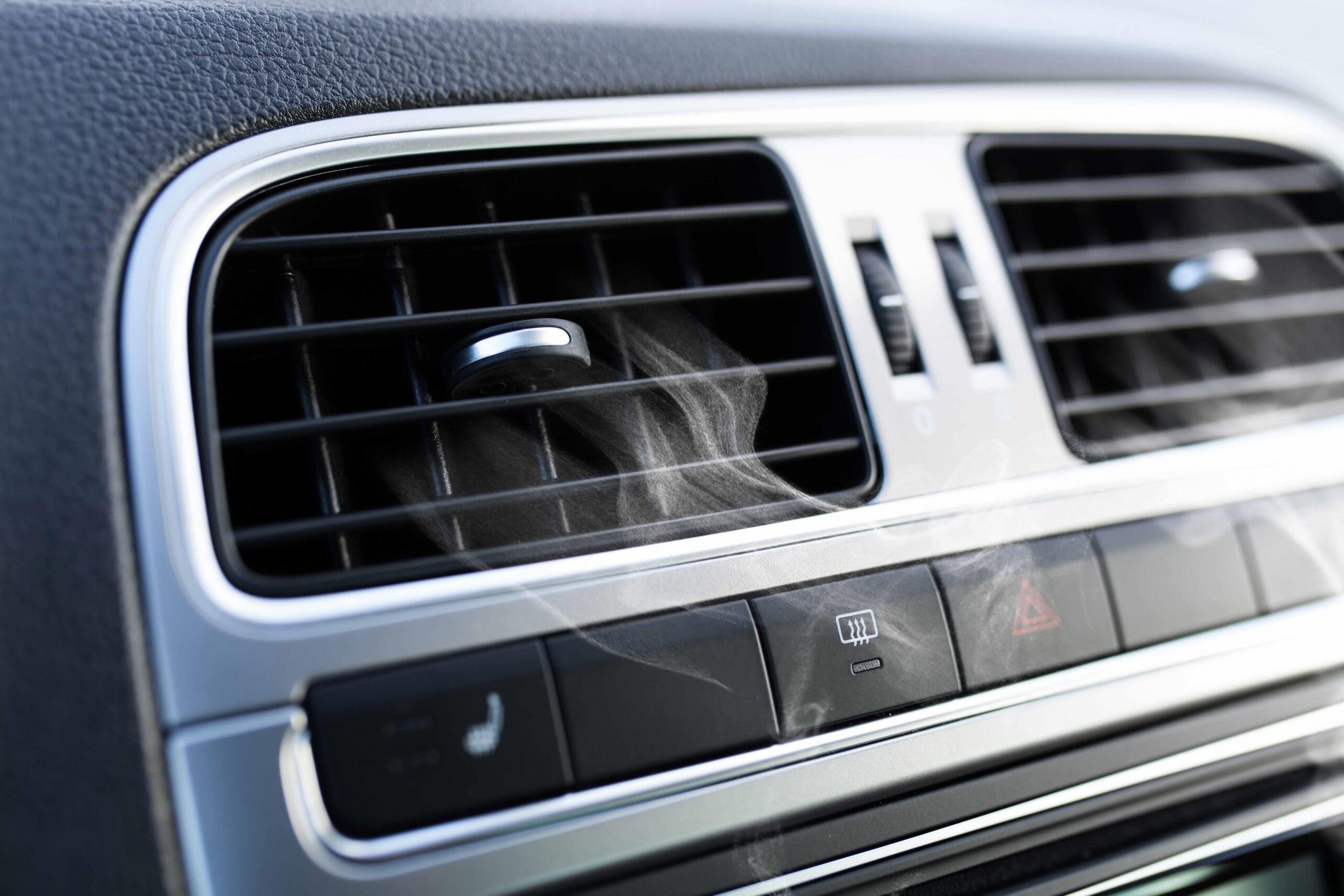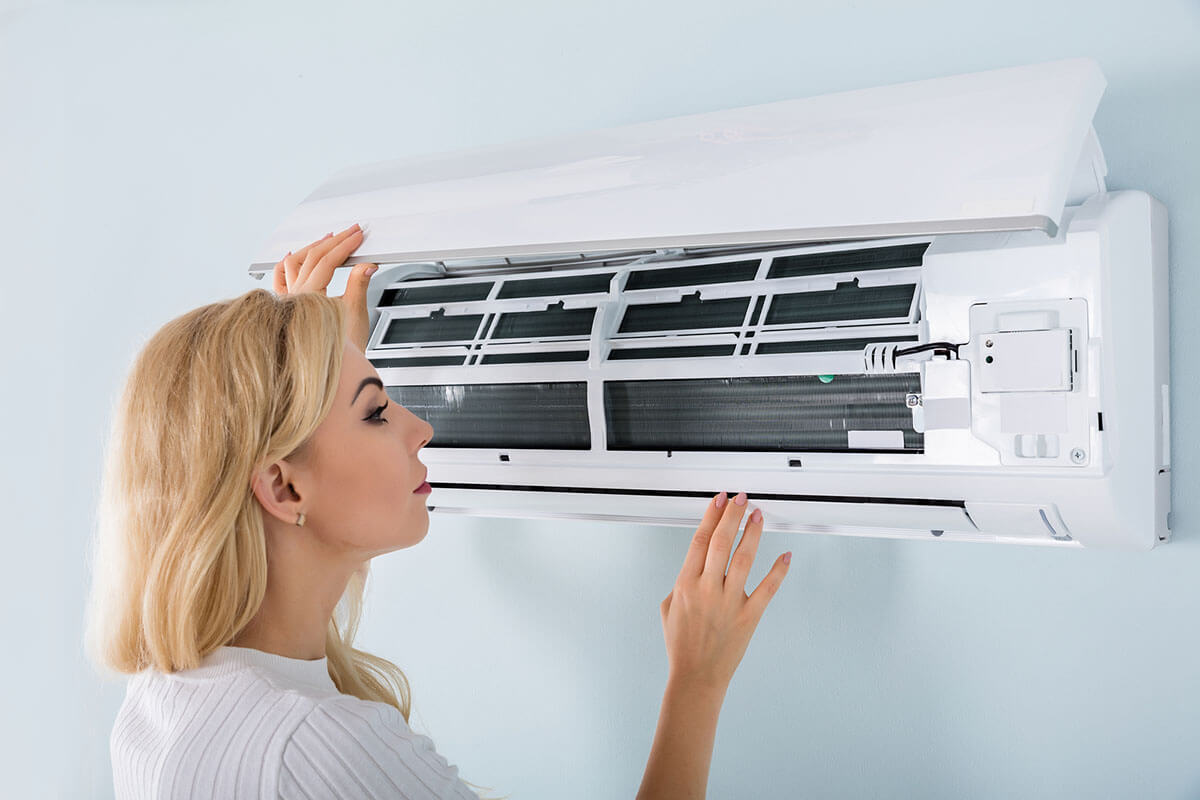Home>Home Maintenance>Why Does My Window Air Conditioner Smell Like Pee


Home Maintenance
Why Does My Window Air Conditioner Smell Like Pee
Modified: March 7, 2024
Discover the Reason Behind That Unpleasant Odor Coming from Your Window Air Conditioner. Get Home Maintenance Tips to Address the Issue and Eliminate the Unwanted Pee-Like Smell.
(Many of the links in this article redirect to a specific reviewed product. Your purchase of these products through affiliate links helps to generate commission for Storables.com, at no extra cost. Learn more)
Introduction
Have you noticed an unpleasant odor emanating from your window air conditioner? If it smells like pee, you’re not alone. While it may be quite disconcerting, there are several possible causes for this unpleasant smell. Understanding these causes and knowing how to address them can help you eliminate the offending odor and restore fresh air to your home.
A window air conditioner is a popular cooling solution for many households, especially in areas where central air conditioning may not be available or practical. These units provide efficient and localized cooling, but they can also be susceptible to certain issues, including foul odors.
In this article, we will explore the possible causes of a window air conditioner smelling like pee and discuss the steps you can take to address and prevent this issue. Whether you are dealing with a minor annoyance or a major concern, understanding the root cause of the odor will empower you to take appropriate action.
Key Takeaways:
- Keep your window air conditioner smelling fresh by cleaning the air filter and drainage system regularly. Prevent mold, pests, and improper maintenance to avoid unpleasant odors and maintain a healthy home environment.
- Address the root causes of odor in your window air conditioner by using odor eliminators and implementing preventive measures. Regular cleaning, proper ventilation, and proactive pest control are key to a fresh-smelling home.
Read more: Why Does My Air Conditioner Smell Like Pee
Possible Causes of the Odor
There are several potential reasons why your window air conditioner might emit an unpleasant odor resembling urine. It’s important to identify the cause so that you can effectively eliminate the odor and prevent it from recurring. Let’s explore some of the most common causes:
- Mold and Mildew Growth: One possible cause of the urine-like odor is the growth of mold and mildew inside the air conditioner unit. These microscopic organisms thrive in damp environments, and the moisture within the unit provides an ideal breeding ground. If the air conditioner has not been properly cleaned or maintained, mold and mildew can accumulate on the cooling coils, filters, or other interior components, resulting in the unpleasant odor.
- Clogged Drainage System: Another potential culprit is a clogged drainage system. The window air conditioner is designed to remove excess moisture from the air, and this moisture is typically drained away through a small drainage pipe or tray. However, if the drainage system becomes blocked with dust, debris, or algae growth, the stagnant water can emit an offensive odor that resembles urine.
- Animal Infestation: Believe it or not, animals seeking shelter or nesting spots may find their way into your window air conditioner. Pests like mice or birds can enter through gaps or openings in the unit and leave behind urine and feces, resulting in a foul smell. It’s essential to check for signs of infestation and take appropriate measures to remove any pests or their waste.
- Improper Maintenance: Neglecting to perform regular maintenance on your window air conditioner can also lead to unpleasant odors. If the unit is not cleaned regularly or if filters are not replaced as recommended, dirt, dust, and debris can accumulate and cause a foul smell. Additionally, failing to clean the exterior of the unit can also contribute to odors, as dirt and grime build-up can create an unpleasant scent.
Identifying which of these factors is causing the foul odor in your window air conditioner is the first step towards resolving the issue. Once you have pinpointed the cause, you can take the necessary steps to eliminate the odor and prevent it from recurring in the future.
Mold and Mildew Growth
Mold and mildew are common culprits when it comes to unpleasant odors in a window air conditioner. These fungi thrive in dark and damp environments, and without regular cleaning and maintenance, they can easily take hold in your unit.
The cooling coils and filters of the air conditioner provide the perfect conditions for mold and mildew growth. As the unit cools the air, moisture condenses on the coils and is collected on the filters. If these components are not cleaned regularly, mold and mildew can flourish, releasing an offensive odor.
To tackle the issue of mold and mildew growth, you will need to perform a thorough cleaning of your window air conditioner. Here are the steps you can take:
- Turn off the air conditioner: Before you begin cleaning, make sure to turn off and unplug the unit for safety.
- Remove the filter: Take out the filter from the unit. Depending on the model, the filter may be located behind the front panel or on the side of the unit. Refer to the manufacturer’s instructions if needed.
- Clean the filter: Rinse the filter with warm water and a mild detergent to remove any dirt, dust, and mold buildup. Allow the filter to air dry completely before placing it back in the unit.
- Clean the cooling coils: Use a soft brush or cloth to gently clean the cooling coils. Avoid using harsh chemicals that may damage the coils. If there is excessive mold or mildew growth, you can use a mixture of equal parts water and vinegar to help eliminate it.
- Check for mold in other parts: Inspect other interior components of the air conditioner, such as the fan blades and the drainage tray. If you notice any mold or mildew, clean them using the same mixture of water and vinegar or a mild detergent solution.
- Dry the unit thoroughly: Once you have finished cleaning, make sure all the components are dry before reassembling the unit and turning it back on. Moisture can promote the growth of mold and mildew, so it’s important to ensure everything is completely dry.
Regularly cleaning your window air conditioner, specifically targeting areas prone to mold and mildew growth, will help prevent the unpleasant odor from reoccurring. Additionally, consider using a dehumidifier in the room where the air conditioner is installed to reduce excess moisture and inhibit the growth of mold and mildew.
Clogged Drainage System
A clogged drainage system can also be a common cause of the unpleasant odor in your window air conditioner. The purpose of the drainage system is to remove excess moisture that is collected during the cooling process. If this system becomes blocked or restricted, stagnant water can accumulate, leading to a foul smell that resembles urine.
To address a clogged drainage system and eliminate the odor, follow these steps:
- Turn off the air conditioner: As with any maintenance procedure, always start by turning off and unplugging the unit to avoid any potential accidents.
- Locate the drainage pipe or tray: In most window air conditioners, the drainage pipe or tray is located at the back or bottom of the unit. Look for a plastic tube or tray that may be connected to the back of the unit or underneath it.
- Inspect for blockages: Examine the drainage pipe or tray for any visible blockages, such as dirt, dust, or debris. Use a flashlight if necessary to get a clear view of the inside.
- Clean the drainage system: If you spot any blockages, use a small brush or pipe cleaner to gently remove them. Be careful not to damage or bend the pipe while doing so. You can also flush the drainage pipe with a mixture of equal parts water and vinegar to help eliminate any built-up grime or algae.
- Check the drainage tray: If your unit has a tray instead of a pipe, remove the tray and empty any stagnant water. Wipe the tray with a mild detergent or vinegar solution to remove any residue or odor-causing substances.
- Clear the drain openings: Some units may have small drain openings on the underside or back. Check if these openings are clear from obstructions and gently clean them using a toothpick or a small brush.
- Reassemble and test: After cleaning and ensuring that the drainage system is clear, reassemble the unit and plug it back in. Turn on the air conditioner and observe if the foul odor persists. With a clean and functioning drainage system, the unpleasant smell should gradually dissipate.
Regularly inspecting and cleaning the drainage system of your window air conditioner, especially during periods of heavy use, can help prevent blockages and maintain proper moisture removal. This will not only eliminate the odor but also ensure that your unit operates efficiently.
Animal Infestation
Believe it or not, animal infestation can be a surprising cause of the urine-like odor in your window air conditioner. Small pests like mice, rats, or birds may find their way into your unit, seeking shelter or a cozy nesting spot. Unfortunately, these pests can leave behind urine, feces, and other waste materials that can emit a foul smell.
If you suspect an animal infestation in your window air conditioner, follow these steps to address the issue:
- Turn off the air conditioner: Start by turning off and unplugging the unit to prevent any accidents or interference while dealing with the infestation.
- Inspect the unit: Carefully examine the unit for any signs of animal activity. Look for droppings, nesting materials, or chewed wires. Pay close attention to any gaps, openings, or damaged parts of the unit, as these may be entry points for pests.
- Remove the pests: If you discover any animals or evidence of their presence, it’s important to remove them as gently as possible. You may want to contact a pest control professional for assistance, as they will have the knowledge and tools to handle the situation safely and effectively.
- Clean and disinfect: After removing the pests, thoroughly clean and disinfect the affected areas of your window air conditioner. Wear gloves and use a disinfectant cleaner to sanitize any surfaces that may have come into contact with animal waste. This will help eliminate the odor and prevent the spread of bacteria or diseases.
- Seal entry points: To prevent future infestations, identify and seal any gaps or openings in and around your window air conditioner. Use caulk, weatherstripping, or metal mesh to close off these entry points and make it more difficult for pests to enter.
- Regularly inspect and maintain: It’s important to continue monitoring your window air conditioner for any signs of animal activity. Regularly clean and maintain the unit, ensuring that there are no new signs of infestation. Promptly address any issues to prevent a recurrence of the unpleasant odor.
Dealing with an animal infestation in your window air conditioner can be challenging, but by taking immediate action, you can eliminate the odor and prevent further damage to your unit. Remember to prioritize your safety and seek professional assistance if needed.
Improper Maintenance
Improper maintenance practices can contribute to the development of unpleasant odors in your window air conditioner. Neglecting regular cleaning and maintenance can allow dirt, dust, and debris to accumulate, resulting in a foul smell.
To address the issue of improper maintenance and eliminate the odor, follow these steps:
- Turn off the air conditioner: As always, start by turning off and unplugging the unit to ensure your safety while performing maintenance.
- Clean the exterior: Begin by cleaning the exterior surfaces of the air conditioner. Use a damp cloth or sponge and a mild detergent to remove any dirt, grime, or accumulated dust. Wipe down the front panel, sides, and any visible parts of the unit.
- Clean the air filter: The air filter is responsible for removing airborne particles from the air before it enters the unit. Over time, the filter can become clogged with dust and debris, leading to odor issues. Depending on the type of filter, you can either replace it with a new one or clean it thoroughly using water and a mild detergent. Make sure to let the filter dry completely before reinstalling it.
- Clean the interior components: Use a soft brush or cloth to gently clean the interior components of the window air conditioner. Pay close attention to the cooling coils, fan blades, and any other visible parts that may have accumulated dirt or dust. Be careful not to damage any sensitive components.
- Check the drainage system: Inspect the drainage pipe or tray to ensure it is clear and free from any blockages. Clean or unclog the drainage system as necessary, following the steps outlined in the previous section.
- Perform routine maintenance: Establish a regular maintenance schedule for your window air conditioner. This includes cleaning or replacing the air filter every few months, inspecting and cleaning the unit’s interior components, and checking for any signs of damage or wear. Regular maintenance will prevent the buildup of dirt and debris, keeping your unit odor-free and functioning efficiently.
By practicing proper maintenance and regularly cleaning your window air conditioner, you can prevent foul odors and ensure optimal performance. Maintaining a clean and well-maintained unit will not only improve air quality but also prolong the lifespan of the appliance.
To get rid of the pee smell in your window air conditioner, try cleaning the filter and the inside of the unit with a mixture of water and vinegar. This can help remove any built-up bacteria causing the odor.
Steps to Get Rid of the Odor
If you’re dealing with a window air conditioner that smells like pee, there are steps you can take to eliminate the odor and restore a fresh and pleasant environment in your home. Here’s what you can do:
- Identify the source: As discussed earlier, determine the underlying cause of the odor by considering factors such as mold and mildew growth, a clogged drainage system, animal infestation, or improper maintenance. Understanding the source will help you take appropriate action to address the issue.
- Clean the unit: Start by thoroughly cleaning your window air conditioner. Remove the air filter and clean it using warm water and a mild detergent. Gently clean the cooling coils, fan blades, and other interior components using a soft brush or cloth. Ensure the unit is completely dry before reassembling it.
- Clean the drainage system: If the odor is caused by a clogged drainage system, follow the steps outlined earlier to clear the blockages. Clean the drainage pipe or tray, removing any debris or algae growth. Ensure that the drainage system is functioning properly to prevent stagnant water and odor buildup.
- Use odor eliminators: To further combat the unpleasant odor, consider using odor eliminators. There are various options available, such as air fresheners, deodorizing sprays specifically designed for air conditioners, or natural remedies like baking soda or activated charcoal. Place these odor eliminators near the unit or as directed on the packaging to help neutralize the smell.
- Keep the surrounding area clean: Pay attention to the cleanliness of the room where the air conditioner is installed. Regularly dust and vacuum the area to minimize the introduction of dust and allergens into the unit, which can contribute to odors. Additionally, ensure that pets are not urinating in the vicinity of the air conditioner, as this can also lead to unpleasant smells.
- Regular maintenance: Implement a maintenance routine to prevent recurring odors and ensure the optimal functioning of your window air conditioner. Clean or replace the air filter regularly, inspect and clean the unit’s interior components, and check the drainage system periodically to keep everything in good working condition.
By following these steps, you can effectively get rid of the odor and enjoy a fresh and pleasant environment in your home once again. Remember to practice regular maintenance and cleanliness to prevent the odor from returning.
Cleaning the Air Filter
The air filter in your window air conditioner plays a crucial role in maintaining air quality and preventing the accumulation of dirt and debris. Over time, however, the filter can become clogged, leading to unpleasant odors. Cleaning the air filter is an essential step in eliminating the odor and restoring optimal performance. Here’s how you can do it:
- Turn off the air conditioner: Begin by turning off and unplugging the unit to ensure your safety during the cleaning process.
- Locate the air filter: Depending on the model of your window air conditioner, the air filter is typically located either behind the front panel or on the side of the unit. Refer to the manufacturer’s instructions if needed.
- Remove the air filter: Carefully remove the air filter from its housing. Some models may have a latch or release button, while others may require you to slide it out from the side.
- Inspect the air filter: Take a close look at the air filter to assess its condition. If it is discolored, covered in dirt or dust, or visibly clogged, it’s time to clean it.
- Clean the air filter: Rinse the air filter under warm running water to remove loose dirt and debris. If the grime is stubborn, you can gently scrub it with a soft brush or toothbrush using a mild detergent. Be sure to clean both sides of the filter thoroughly.
- Rinse and dry the air filter: After cleaning, rinse the air filter again to remove any remaining soap residue. Shake off any excess water and allow the filter to dry completely. It’s essential to ensure the filter is completely dry before reinserting it into the unit to prevent mold or mildew growth.
- Reinstall the air filter: Once the air filter is dry, place it back into its housing in the window air conditioner. Make sure it is properly aligned and securely in place.
- Set a cleaning schedule: To maintain optimal performance and air quality, establish a regular cleaning schedule for the air filter. How often you should clean it depends on factors like usage and environmental conditions, but as a general guideline, aim to clean it every one to three months.
By regularly cleaning the air filter of your window air conditioner, you can significantly reduce the risk of unpleasant odors developing and ensure that the appliance operates efficiently. Incorporate this simple cleaning task into your routine maintenance to maintain fresh and clean air throughout your home.
Cleaning the Drainage System
A clogged drainage system in your window air conditioner can lead to stagnant water and the development of foul odors. To eliminate these odors and restore proper drainage, it is important to clean the drainage system. Here’s a step-by-step guide on how to do it:
- Turn off the air conditioner: Begin by turning off and unplugging the unit to ensure your safety during the cleaning process.
- Locate the drainage system: The drainage system of a window air conditioner typically consists of a drainage pipe or tray. The pipe is usually located at the back or bottom of the unit, while the tray is often found underneath.
- Inspect for blockages: Carefully examine the drainage pipe or tray for any visible blockages. Look out for dirt, dust, debris, or algae growth that may impede the flow of water. Use a flashlight if needed to get a clear view of the inside.
- Clean the drainage pipe: If the air conditioner has a drainage pipe, detach it from the unit. Use a small brush or pipe cleaner to gently remove any blockages. You can also flush the pipe with a mixture of equal parts water and vinegar to help dislodge any built-up grime or algae.
- Clean the drainage tray: If your unit has a drainage tray, remove it and empty any stagnant water. Rinse the tray with a mild detergent or vinegar solution to remove any residue or odor-causing substances.
- Clear drain openings: Some window air conditioners have small drain openings on the underside or back. Inspect these openings and ensure they are clear from any obstructions. Use a toothpick or a small brush to gently clean them if necessary.
- Reassemble and test: Once you have cleaned the drainage system, reassemble the unit and plug it back in. Turn on the air conditioner and monitor for any continuation of the foul odor. With a clear and functioning drainage system, the unpleasant smell should gradually dissipate.
- Maintain regular upkeep: To prevent future blockages and odors, incorporate regular maintenance of the drainage system into your routine. Inspect the system periodically, remove any debris, and flush it with a solution of water and vinegar to keep it clean and free-flowing.
By cleaning the drainage system of your window air conditioner, you can ensure proper water drainage, prevent foul odors, and maintain the overall performance and efficiency of the unit. Regular maintenance will help you enjoy fresh and clean airflow in your home.
Read more: Why Does My AC Smell Like Pee
Using Odor Eliminators
If your window air conditioner continues to emit unpleasant odors even after cleaning, you may consider using odor eliminators to neutralize the smell. These products are specifically designed to combat odors and restore a fresh and pleasant environment in your home. Here are some effective options for using odor eliminators:
- Air fresheners: Air fresheners are a popular choice for masking odors and creating a pleasant aroma. You can find a variety of air fresheners in different scents and formats, such as sprays, plugins, or solid gel. To use, simply follow the instructions on the packaging and place the air freshener near the window air conditioner or in the area where the odor is most noticeable.
- Deodorizing sprays: Specific deodorizing sprays designed for air conditioners can help eliminate odors effectively. Look for a spray designed for HVAC systems or air conditioners and apply it according to the instructions on the product label. These sprays typically have a fresh scent that can neutralize odors and leave a pleasant fragrance in the air.
- Natural remedies: If you prefer a more natural approach, there are several household items that can help absorb and eliminate odors. Baking soda and activated charcoal are excellent natural odor absorbers. Place an open container of baking soda or activated charcoal near the window air conditioner to absorb and neutralize the odors. Remember to replace or refresh these natural remedies regularly for optimal effectiveness.
- Cleaning solutions: In some cases, the odor may persist due to lingering bacteria or mold. Consider using a cleaning solution specifically designed for air conditioners or HVAC systems. These solutions often contain disinfectants that can kill bacteria and eliminate odors. Apply the cleaning solution as directed on the product label and ensure proper ventilation during and after the cleaning process.
- Professional odor elimination services: If you’ve tried various methods without success, or if the odor is persistent and severe, it may be worth considering professional odor elimination services. Companies specializing in odor removal have the expertise and equipment to effectively neutralize and eliminate odors, leaving your home smelling fresh and clean.
Remember that while odor eliminators can help mask and neutralize odors, it’s crucial to address the underlying cause of the smell. Proper cleaning, maintenance, and preventive measures will help tackle the root cause and prevent future odors from occurring.
Preventive Measures to Avoid the Odor
To prevent your window air conditioner from developing unpleasant odors, it’s important to take proactive measures and incorporate preventive maintenance into your routine. By following these preventive measures, you can reduce the chances of odor buildup and ensure a fresh and clean air environment in your home:
- Regular cleaning: One of the most effective ways to prevent odors is to establish a regular cleaning schedule for your window air conditioner. Clean the air filter every one to three months, depending on usage and environmental conditions. Additionally, periodically clean the cooling coils, fan blades, and other interior components to remove dirt, dust, and debris that can lead to odor development.
- Maintain proper ventilation: Adequate airflow is essential to prevent the accumulation of moisture and the growth of mold and bacteria. Ensure that the area around the window air conditioner is well-ventilated and that furniture or other objects do not block the airflow. This will help minimize condensation and reduce the risk of odors.
- Monitor humidity levels: Excessive humidity can contribute to the growth of mold and mildew. Use a dehumidifier in the room where the air conditioner is installed to maintain optimal humidity levels. This will help inhibit the development of odors caused by mold and mildew.
- Regularly inspect for pests: Prevent animal infestations by regularly inspecting your window air conditioner for any signs of pests. Seal any openings or gaps where pests may enter and avoid leaving food or garbage near the unit, as this can attract unwanted visitors.
- Change filters as recommended: Follow the manufacturer’s recommendations for filter replacement. Over time, air filters can become clogged and less effective at trapping dust and allergens, leading to odors. Regularly replacing the filter will help maintain clean airflow and prevent odors from developing.
- Keep the unit clean: In addition to regular cleaning, keep the exterior of the window air conditioner clean. Wipe down the surfaces with a damp cloth and mild detergent to remove dirt and dust buildup. This will help maintain the overall cleanliness and prevent odors from lingering on the unit.
By incorporating these preventive measures into your maintenance routine, you can minimize the chances of your window air conditioner developing unpleasant odors. Regular cleaning, proper ventilation, and proactive pest control will keep your unit in top condition and ensure fresh, clean air in your home.
Conclusion
Dealing with a window air conditioner that smells like pee can be an unpleasant experience, but with the right knowledge and preventive measures, you can effectively eliminate the odor and maintain a fresh and clean air environment in your home.
Understanding the possible causes of the odor, such as mold and mildew growth, a clogged drainage system, animal infestation, or improper maintenance, is crucial for addressing the issue at its root. Taking proactive steps like cleaning the air filter, maintaining the drainage system, using odor eliminators, and implementing regular maintenance practices will help you prevent odors from developing in the first place.
Remember to establish a cleaning schedule for your window air conditioner, focusing on key areas like the air filter and interior components. Regularly inspect the drainage system to ensure proper water flow and maintain ventilation to reduce moisture and prevent mold growth. Taking preventive measures such as sealing openings to deter pests and maintaining proper humidity levels will also contribute to odor prevention.
By following these guidelines and incorporating preventive maintenance into your routine, you can ensure that your window air conditioner operates efficiently, provides clean and fresh airflow, and remains free from unpleasant odors.
In the end, maintaining a well-functioning and odor-free window air conditioner will not only enhance your comfort but also contribute to a healthier and more enjoyable home environment.
Frequently Asked Questions about Why Does My Window Air Conditioner Smell Like Pee
Was this page helpful?
At Storables.com, we guarantee accurate and reliable information. Our content, validated by Expert Board Contributors, is crafted following stringent Editorial Policies. We're committed to providing you with well-researched, expert-backed insights for all your informational needs.
